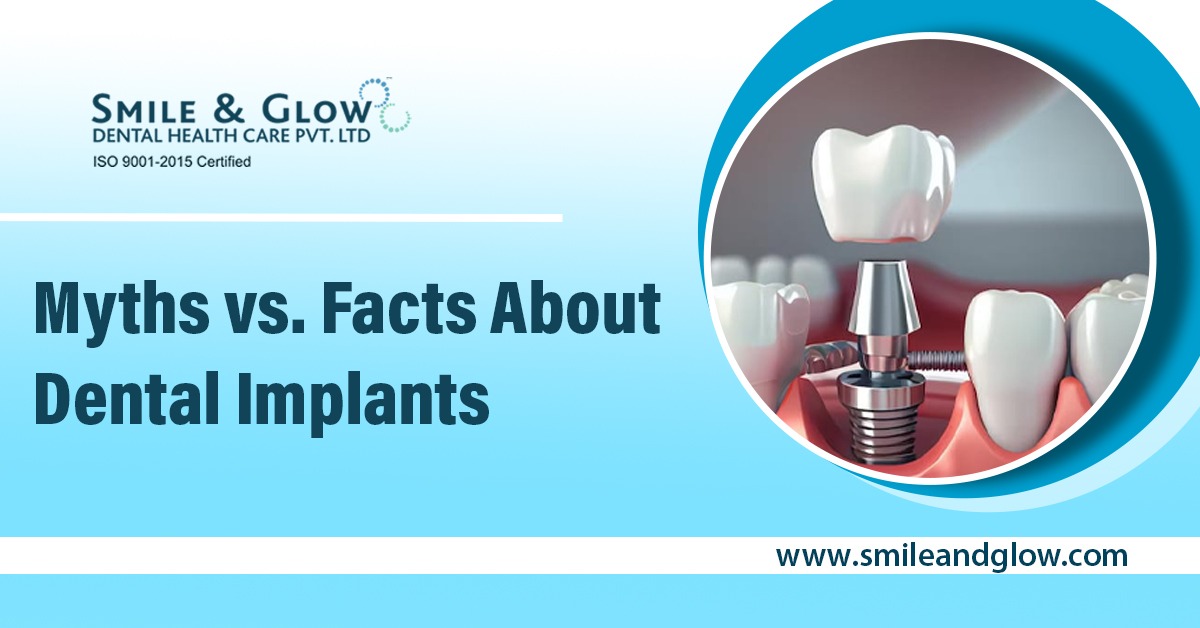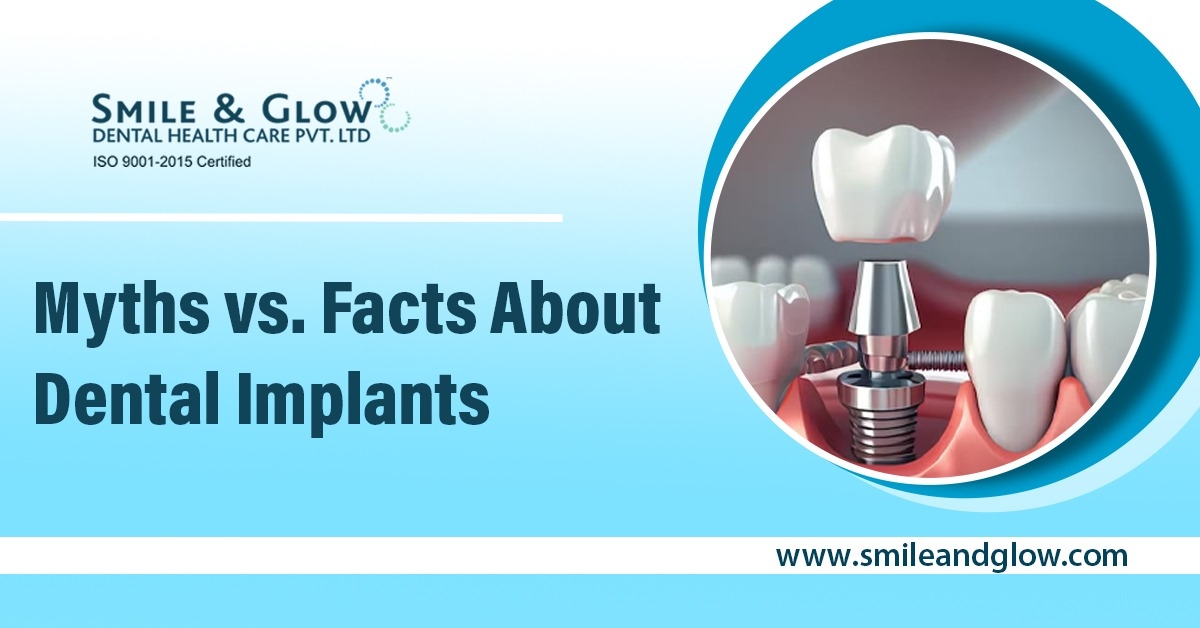
One of the most desired and successful methods for restoring lost teeth is dental implants. There are still a lot of myths and misconceptions about this dental process, despite its success and widespread use. Patients can make more educated decisions about their oral health if they are aware of the facts regarding dental implants. Here, we clarify some of the most common myths and present the truth regarding dental implants.

Myth 1: Dental Implants Are Painful
Fact: Many individuals have a belief that receiving dental implants will be painful, however this is mostly untrue. In order to numb the area and minimize pain during the process, local anesthetic is usually used. During the actual surgery, the majority of patients experience just little discomfort. With over-the-counter painkillers, post-operative pain is normally controllable, and any discomfort usually goes away in a few days. Actually, receiving dental implants usually causes less discomfort than having a tooth extracted.
Myth 2: Dental Implants Are Not Safe
Fact: Dental implants are currently recognized as a reliable and safe method of replacing lost teeth after decades of extensive research and development. Dental Implants are made of high quality medical grade titanium. Materials that easily integrate into the jawbone and are accepted by the body are called biocompatible materials, such as titanium. The operation has a high success rate often over 95% and difficulties are rare when performed by a qualified implantologist. You should schedule routine exams and practice good dental hygiene to further minimize any risks.
Myth 3: Dental Implants Are Only for the Senior People
Fact: Dental implants are appropriate for anyone who has lost a tooth or several teeth, regardless of age, despite the fact that they are typically thought of with older persons. The main prerequisite for a candidate is to have enough jawbone density to support the implant. Dental implants can help younger patients as much as older ones who have lost teeth as a result of trauma, decay, or other causes. But before having the surgery, individuals of all ages must have properly grown jawbones, which usually means waiting until skeletal maturity which is around the age of 18.
Myth 4: Dental Implants Require Special Care
Fact: One of the key advantages of dental implants is that they don't require any special maintenance. In contrast to dentures, which need to be taken out and cleaned on a regular basis, dental implants function just like natural teeth. Similar to how they would take care of their natural teeth, patients can maintain their implants. Periodic dental examinations and good oral hygiene are essential for the long-term health of dental implants, but no special or additional care routines are needed.
Myth 5: Dental Implants Are Noticeable
Fact: Dental implants almost seem like natural teeth when they are positioned correctly. A seamless and natural-looking appearance is guaranteed since the crowns that are affixed to the implants are specially created to match the patient's existing teeth in terms of size, color, and shape. In order to create a confident and attractive smile, dental implants are made to look natural with the surrounding teeth.
Myth 6: Dental Implants Are Too Expensive
Fact: Dental implants do have a higher initial cost than other tooth replacement choices, but over time, their long-term benefits may make them more affordable. In contrast to dentures and bridges, which may require routine replacement or adjustments, dental implants, when properly maintained, offer a long-term solution. They can prevent the need for additional dental work because they last a lifetime. Dental implants also lessen the need for further dental procedures by supporting the preservation of the jawbone and preventing the displacement of neighboring teeth.
Myth 7: Dental Implants Are Only for Replacing Single Teeth
Fact: Because of their versatility, dental implants can be used to replace a single tooth, multiple teeth, or even a complete dental arch. Dental bridges or dentures supported by implants can be a great choice for people who are missing several teeth. These methods restore a large part of the mouth while offering the durability and stability of implants. With implant-supported restorations, patients can eat, speak, and smile with confidence since they are frequently more functional and comfortable than standard dentures or bridges.
If one or more teeth are lost, dental implants provide a long-lasting, secure alternative. However, it's crucial to address a common concern that arises when teeth are removed: the jawbone can shrink in both height and width due to changes in muscle attachments. This shrinkage can cause the face to appear older, as the loss of bone structure leads to changes in facial contours. To prevent these issues, it is vital that the dentist places dental implants immediately after tooth extraction. By doing so, the implants help maintain the normal position of the muscles, preserving both the aesthetic appearance and functionality of the face.
By dispelling these widespread beliefs, it becomes evident that dental implants are essential not only for restoring a gorgeous smile but also for preserving overall oral health and facial structure. If you are considering dental implants, seeking advice from a qualified dentist who can provide accurate information and individualized treatment is important. This approach ensures that the implants serve both their aesthetic and functional purposes, helping you maintain a youthful appearance and optimal oral health.
Dr. K. Senthil Kumar and Dr. S. Hemamalathi are both leading experts in implantology, microscopic endodontics, and aesthetic dentistry. Dr. S. Hemamalathi specialized in microscopic dentistry, offering advanced treatments such as root canal therapy, minimally invasive dentistry, and micro keyhole surgeries. Their expertise ensures that patients receive the highest standard of care, whether undergoing dental implant procedures or other complex dental treatments.









